Goshawk Surname Ancestry ResultsOur indexes 1000-1999 include entries for the spelling 'goshawk'. In the period you have requested, we have the following 25 records (displaying 1 to 10): Single Surname Subscription | | | Buying all 25 results of this search individually would cost £136.00. But you can have free access to all 25 records for a year, to view, to save and print, for £100. Save £36.00. More... |
These sample scans are from the original record. You will get scans of the full pages or articles where the surname you searched for has been found. Your web browser may prevent the sample windows from opening; in this case please change your browser settings to allow pop-up windows from this site.  Masters of apprentices registered in Norwich
(1793) Masters of apprentices registered in Norwich
(1793)
Apprenticeship indentures and clerks' articles were subject to a 6d or 12d per pound stamp duty: the registers of the payments usually give the master's trade, address, and occupation, and the apprentice's name, as well as details of the date and length of the apprenticeship. There are central registers for collections of the stamp duty in London, as well as returns from collectors in the provinces. These collectors generally received duty just from their own county, but sometimes from further afield. The indentures themselves can date from a year or two earlier than this return. (The sample entry shown on this scan is taken from a Bristol return. Each entry has two scans, the other being the facing page with the details of the indenture, length of service, and payment of duty.) IR 1/67GOSHAWK. Cost: £8.00.  | Sample scan, click to enlarge

| Cambridgeshire Voters: Willingham
(1832)
The poll on the election of three knights of the shire to serve in Parliament for the county of Cambridge, was taken at Cambridge, Royston, Newmarket, Ely, Wisbech and Whittlesea 18 and 19 December 1832. The candidates were Henry John Adeane esquire, Richard Greaves Townley esquire, Charles Philip Yorke esquire and John Walbanke Childers esquire. This poll book sets out the names of the voters in alphabetical order hundred by hundred and parish by parish. The voters' full names are stated, surname first. The right hand column records their votes. The new qualification for suffrage in the counties, after the passage of the 1832 Great Reform Bill, was the possession of a freehold estate worth 40s a year or more, a copyhold or long leasehold of £10 a year or more, or a tenancy or short leasehold of £50 a year or more.
GOSHAWK. Cost: £6.00.  | Sample scan, click to enlarge

| Voters in the Western Division of Norfolk, for the parish of North Elmham
(1837)
Under the Reform Act of 1832, the County of Norfolk was allotted four Members of Parliament, being two Knights of the Shire for the Eastern Division and two for the Western. The Western Division included the hundreds of Brothercross, Clackclose, Freebridge Lynn, Freebridge Marshland, Gallow, North Greenhoe, South Greenhow, Grimshoe, Guiltcross, Holt, Launditch, Mitford, Shropham, Smithdon and Wayland. Polling in 1837 took place at Swaffham, Downham, Fakenham, Lynn Regis, Thetford and East Dereham. The franchise was available to freeholders worth 40s a year or over; copyholders and long leaseholders of £10 or more; short leaseholders and tenants of £50 or more: but limited to adult males. Voting took place on 1 and 2 August 1837. This poll book lists the voters for each parish, with the votes cast. Each voter had two votes: the votes are indicated in the columns F. (Sir William Henry Browne Folkes, 2838); A. (Sir Jacob Astley, 2713); B. (William Bagge, 3178); and C. (William Lyde Wiggett Chute, 2877). The voters were not necessarily resident in the parish, but derived their franchise from the land there; so some of the names have addresses outside the parish, not a few living in different counties. Not everyone voted, but everyone with a vote was listed in the poll book: persons who qualified for voting in two parishes (but nevertheless had just the one vote per person) are noted as such.GOSHAWK. Cost: £6.00.  | Sample scan, click to enlarge
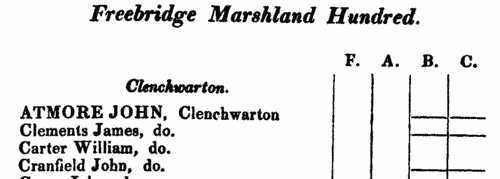
| Electors of North Elmham
(1840)
The register of electors entitled to vote in any parliamentary election for West Norfolk between 1 November 1840 and 1 November 1841 lists 7,620 freeholders arranged by hundred and within hundred by parish or township &c. In the first column, after number within the register, the elector's name is given (surname first); the second column gives place of abode; the third column the nature of qualification (such as 'owner and occupier'); and the fourth column the address of the qualifying property, in some cases with the name of the tenant or occupier.GOSHAWK. Cost: £4.00.  | Sample scan, click to enlarge

| Pupil Teachers in Middlesex: Boys
(1851)
The Committee of Council on Education awarded annual grants for the training and support of pupil teachers and stipendiary monitors in schools in England, Wales, Scotland, the Isle of Man and the Channel Islands. Pupil teachers started training between the ages of 13 and 15, and 'must not be subject to any bodily infirmity likely to impair their usefulness as Pupil Teachers, such as scrofula, fits, asthma, deafness, great imperfections in the sight or voice, the loss of an eye from constitutional disease, or the loss of an arm or leg, or the permanent disability of either arm or leg, curvature of the spine, or a hereditary tendency to insanity'.
They also had to obtain certificates from the managers of the school (and their clergyman, in the case of Church of England schools) as to their moral character and that of their family; good conduct; punctuality, diligence, obedience, and attention to duty; and attentiveness to their religious duties.
This detailed statement in the annual report of the committee for the year ending 31 October 1851 lists schools by county, giving:
1. Name and Denomination of School, with these abbreviations - B, British and Foreign School Society; F. C., Free Church of Scotland; H. C., Home and Colonial School Society; N., National Society, or connected with the Church of England; R. C., Roman Catholic Poor-School Committee; Wesn., Wesleyan Methodist.
2. Annual grants conditionally awarded by the committee in augmentation of teachers' salaries, and in stipends to apprentices, and gratuities to teachers.
3. Month in which annual examination was to be held.
4. Names of apprentices, giving surname and initials, and year of apprenticeship. Stipendiary monitors are indicated by (S. M.).GOSHAWK. Cost: £6.00.  | Sample scan, click to enlarge
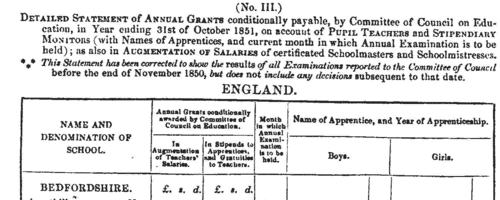
| Missionary donations from Staffordshire
(1855)
The Congregational and a number of other independent churches together formed the Evangelical Alliance, committed to promoting and supporting missions to the heathen. The areas chosen for their projects were Guiana, South Africa, India, the South Seas and China. The work of the missionaries was not only in preaching the Gospel, but also in translating the Bible into local languages, and establishing churches, schools and orphanages. Orphans and native teachers were often given the names of principal contributors or congregations back in Britain. In Britain the large amounts of money needed for this work were raised among the Congregational and independent congregations, arranged by auxiliaries for each county (although some contributions for each county might in fact come in from congregations and individuals in neighbouring areas); money was gathered by ministers, at special services, by supporters, and in missionary boxes. The accounts of all these contributions were published as part of a monthly magazine called the Evangelical Magazine. Each issue of the magazine carried obituaries of prominent members of the congregations; general articles on religion; reviews of newly-published religious books; home news, mainly about meetings of importance or interest by the alliance or in individual churches; and then a separate section called the Missionary Chronicle. The Missionary Chronicle was devoted to letters and reports from the missionaries; and concludes with a set of accounts of donations towards the missionary work. This is the index to the donations reported in the magazine, January to December 1855, from Staffordshire.GOSHAWK. Cost: £6.00.  | Sample scan, click to enlarge
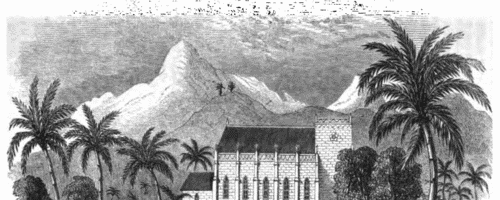
| Traders and professionals in London
(1856)
The Post Office London Directory for 1856 includes this 'Commercial and Professional Directory', recording over 100,000 individuals. GOSHAWK. Cost: £4.00.  | Sample scan, click to enlarge

| Missionaries and contributors
(1864)
The Evangelical Magazine and Missionary Chronicle records the work of Christian missionaries throughout the world, and of the supporting missionary societies collecting money for the work in the British Isles. Contributions are listed by congregation, and by family members making donations.GOSHAWK. Cost: £8.00.  | Sample scan, click to enlarge
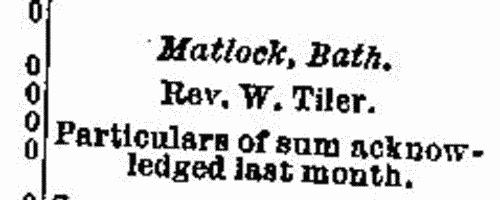
| Recognitions of Congregationalist Ministers: Ministers Assisting
(1868-1869)
In 'The Christian Witness and Congregational Magazine', published monthly, was a section called 'The Congregational Register', detailing recent Congregationalist activity at home and abroad. It included Ordinations; Recognitions (services when a new minister is introduced to his congregation); Calls Accepted (newly-qualified theological students are appointed to their first posts); Removals (of ministers from one place to another); Resignations; Deaths of Ministers; Deaths of Ministers' Wives; Deaths of Ministers' Widows; and Testimonials (presentations by congregations to long-serving or departing ministers). Precise dates and places are usually given in the case of ordinations, recognition services and deaths. The ministers are referred to by surname and initials; the ministers' wives and widows are never given christian name or initials. The register from New Series volume 5, issued from January to December 1869, covers events from October 1868 to November 1869. In the descriptions of ordinations and recognition services, the names of the ministers assisting are usually also given.GOSHAWK. Cost: £6.00.  | Sample scan, click to enlarge
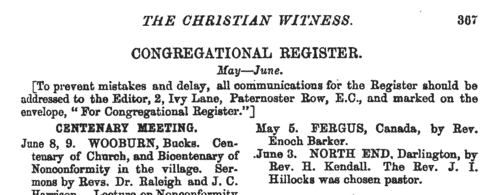
| Baptists
(1873)
The Baptist was a weekly newspaper, with some general news and political coverage, but mainly devoted to chronicling Denominational Intelligence, i. e. the doings of the Baptist churches in Britain and Ireland. January to June 1873.GOSHAWK. Cost: £6.00.  | Sample scan, click to enlarge
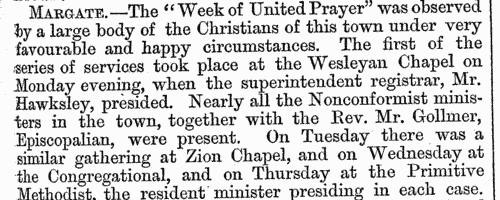
|
Research your ancestry, family history, genealogy and one-name study by direct access to original records and archives indexed by surname.
|













